Iberia
"Massive, beautiful...Unquestionably some of the best writing on Spain...The best that Mr. Michener has ever done on any subject...Stunning...Memorable."
THE WALL STREET JOURNAL
960 pages, Mass Market Paperback
First published January 1,1968
This edition
- Format
-
960 pages, Mass Market Paperback
- Published
-
September 1, 1969 by Fawcett Crest Books
- ISBN
-
9780449207338
- ASIN
-
0449207331
- Language
-
English
About the author
Toward the end of his life, he created the Journey Prize, awarded annually for the year's best short story published by an emerging Canadian writer; founded an MFA program now, named the Michener Center for Writers, at the University of Texas at Austin; and made substantial contributions to the James A. Michener Art Museum in Doylestown, Pennsylvania, best known for its permanent collection of Pennsylvania Impressionist paintings and a room containing Michener's own typewriter, books, and various memorabilia.
Michener's entry in Who's Who in America says he was born on Feb. 3, 1907. But he said in his 1992 memoirs that the circumstances of his birth remained cloudy and he did not know just when he was born or who his parents were.
Readers also enjoyed
Community Reviews
The biggest social differences between then and now is the radical change effected by what a Spanish man called ‘the revolution of the Sueca.’ … [The author was told by a businessman that the term was used to refer to “the Swedish girls” (also Finns, Norwegians, Danes, Germans), who discovered Spain “and flocked down here by the planeload”] Their first impact was on the beaches, and once they stripped down to their bikinis and we saw what the human body could be, the old laws [a society rigidly obeying “puritanism”, “but much stronger than yours in the States, because here the whole society supported it”] simply could not be enforced.And Michener goes on for two pages about how a revolution in morals began to occur. (395ff) But I must mention one more thing about the book. In the Sevilla chapter, the author describes meeting a California photographer in that city, Robert Vavra. (https://en.wikipedia.org/wiki/Robert_...) After looking at his photos, he went back to Vavra and proposed that they do this book together.
Well, the first result of the Sueca invasion was cataclysmic.
I remember the commission we agreed upon: ‘Vavra will go over Spain guided only by his own eye, completely indifferent as to what Michener may write or think or prefer. Shoot a hundred of the very finest pictures he can find and make them his interpretation of Spain. If he can succeed in this, the pictures will fit properly into any text.I haven't counted the pictures in the book, most but not all of which are full-page, black and white, and all by Vavra. But they are a wonderful fulfillment of this commission. Here are a few, with captions from the book.
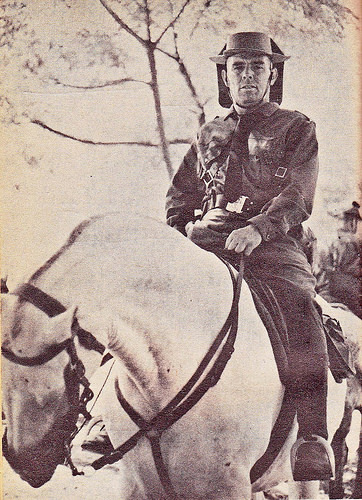 Afoot, on bicycle or on horseback, officers of the Guardia Civil in pairs move back and forth across Spain. [Badajoz]
Afoot, on bicycle or on horseback, officers of the Guardia Civil in pairs move back and forth across Spain. [Badajoz] 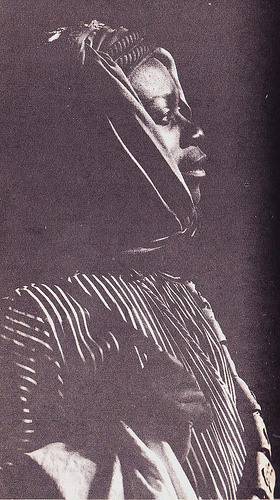
 Film makers from all parts of the world shoot motion pictures with Muslim backgrounds in Spain because the inhabitants recall the Moorish occupation. [Cordoba]
Film makers from all parts of the world shoot motion pictures with Muslim backgrounds in Spain because the inhabitants recall the Moorish occupation. [Cordoba]  Seventeen-year-old gypsy mother. [Cordoba]
Seventeen-year-old gypsy mother. [Cordoba] 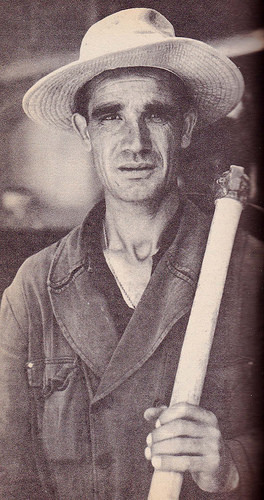 Gravedigger. [Teruel]
Gravedigger. [Teruel] 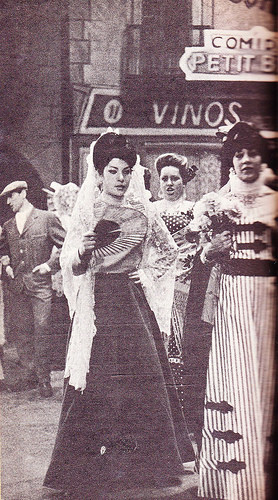 La zarzuela. [Madrid]
La zarzuela. [Madrid] 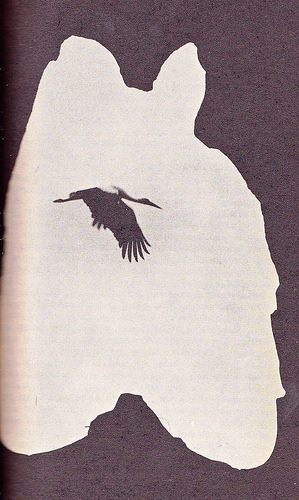 From this carefully designed window of Gaudi’s Templo de la Sagrada Familia a stork is seen on its way to Africa. [Barcelona]
From this carefully designed window of Gaudi’s Templo de la Sagrada Familia a stork is seen on its way to Africa. [Barcelona] 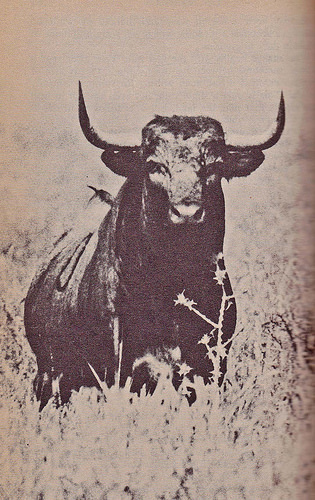 The ancestors of this fighting bull, standing along the banks of the Guadalquivir, were brought up the river by Romans more than two thousand years ago. [Las Marismas]
The ancestors of this fighting bull, standing along the banks of the Guadalquivir, were brought up the river by Romans more than two thousand years ago. [Las Marismas] 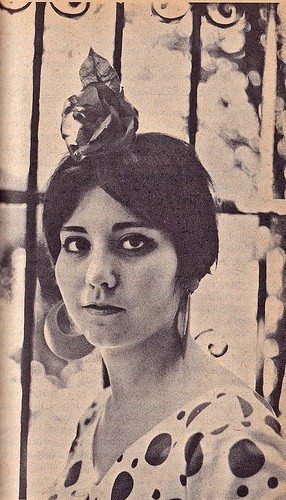 During feria the young women of Sevilla appear at their most seductive. And always in the background, iron bars of tradition. [Sevilla]
During feria the young women of Sevilla appear at their most seductive. And always in the background, iron bars of tradition. [Sevilla] 
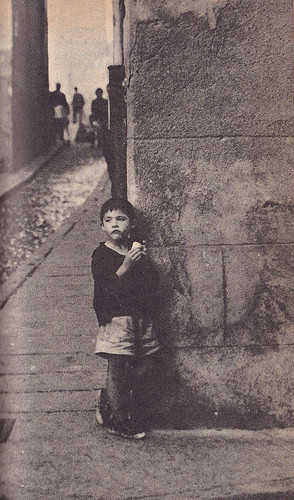 The demureness of the Spanish woman and the arrogance of the Spanish man begin early [Salamanca]
The demureness of the Spanish woman and the arrogance of the Spanish man begin early [Salamanca] 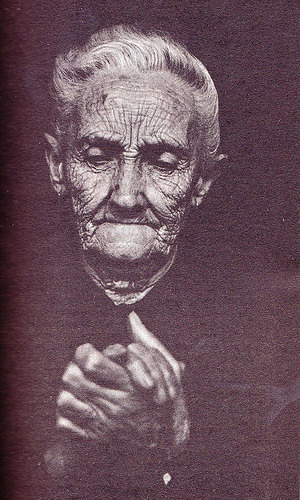 Some handsome things of great age should be left as they are. [Pamplona] . . . . . . . . . . . . . . . . . . . . Previous review: Dune Random review: Plato’s Dialogues Next review: The Classical Greeks an unusual & interesting approach Previous library review: D.H. Lawrence and Italy Next library review: The Ornament of the World snapshots of Andalusia from the middle ages to the expulsion of the Muslins & Jews
Some handsome things of great age should be left as they are. [Pamplona] . . . . . . . . . . . . . . . . . . . . Previous review: Dune Random review: Plato’s Dialogues Next review: The Classical Greeks an unusual & interesting approach Previous library review: D.H. Lawrence and Italy Next library review: The Ornament of the World snapshots of Andalusia from the middle ages to the expulsion of the Muslins & Jews I truly enjoyed delving into Mitchner's personality and his unique idiosyncrasies as he expounded on his relationship with Spain and offered some incisive commentary on his take of events. He was extremely well-versed in various aspects such as the arts, architecture, music, and bull fighting. He also seamlessly incorporated Spanish history into his narrative. I couldn't help but wonder what held him back from penning a novel about Spain. It seemed he had an abundance of historical, geographical, and cultural knowledge at his disposal to create a captivating novel. Perhaps he was too deeply involved with the country to construct a fictional storyline. Or maybe the history alone was so rich that adding fictional characters wouldn't have enhanced the telling significantly.
One can't help but speculate how he would respond to the changes that have occurred in Spain and the world over the past 50 years since this book was written. The book was composed prior to Franco's death and contained some speculations about the potential changes. I visited Spain in 1970 and could identify with the Spain that was described. Just like with many of the non-fiction audio books I've listened to, in order to retain the names and dates, I will require a paper copy.
Currently, this book would be of great interest to those who have a passion for Spain and its history. It might be a bit too lengthy for the casual traveler, but could prove useful for those seeking specific information regarding either a geographical or cultural aspect. I really relished the discussion on bull fighting, but in today's context, the animal welfare issues would cast a significant shadow over such a discussion.
Michener dedicated a significant amount of time to Spain, with a touch of Portugal as well. This book encapsulates his experiences during his visits, along with a wealth of historical details. It's important to note that when this book was penned in the mid-1960s, Franco was still in power.
While Michener was enamored with its history, I, on the other hand, was appalled, much like I am with a great deal of world history. Kings and Bishops, it seems, committed numerous atrocities for their own self-serving motives.
As I delved into this book, I couldn't help but wonder how much Spain has transformed since then. My perception is that Michener believed a great deal remained unchanging. However, I suspect he would be quite surprised by the extent of the changes that have occurred.












































